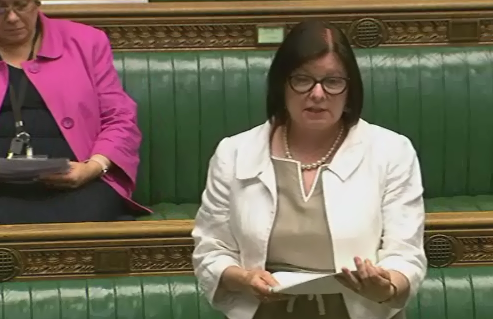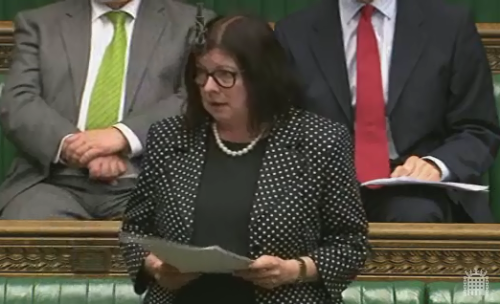
Yesterday I addressed the conference of the National Infrastructure Planning Association. It was an excellent conference, including many of the industry’s leading experts. You can read my speech on the importance of infrastructure below.
The current infrastructure pipeline is currently valued at £310 billion. (As you no doubt heard from the Minister earlier) These projects could provide an enormous boost the flat lining economy – but in reality the vast majority of these sites are stalled.
No one in this room can be in any doubt about the importance of bringing forward these projects quickly, smoothly and effectively.
Indeed there are very few people in Westminster who need convincing either. The important role that infrastructure will play in our economic recovery and must continue to play for a sustainable and competitive economy is almost universally recognised in Parliament and Whitehall.
There is a strong political case for improved infrastructure delivery too. Not only would it create jobs, but without government finance it is consumers that will bear the brunt with higher fares, slower commutes and rocketing bills.
As a result the Government is under increasing pressure to do something about the huge number of major infrastructure projects currently languishing on the backburner.
This has been reflected in the raft of legislative measures brought forward which tinker with the major infrastructure planning regime as most recently seen in the Growth and Infrastructure Act. The need for a boost to infrastructure has also been acknowledged by the Treasury which promised £3billion a year more capital spending in this year’s budget.
However, these claims are worthless unless they are backed up with a long-term strategic plan of what we are going to deliver, when, where and how.
George Osborne’s plan to attract £20 billion of infrastructure investment from sovereign wealth funds has attracted just £1 billion.
Only 14% of the Government 576 national infrastructure projects are underway and fewer than one in four – including road rail and energy schemes – are expected to be completed during this parliament.
This record forced the cross-party House of Commons Public Accounts Committee to last week brand the Government’s approach to infrastructure “simply a long list of projects requiring huge amounts of money, not a real plan with a strategic vision and clear priorities”.
And far from a streamlining of planning we have seen a huge increase in the amount of planning legislation – in fact the research from the centre for policy studies released this week shows that far from the promised ‘bonfire of planning regulation’ 278 new planning laws in were made in the first 6 months of 2011. The result of which, the think tank concluded, ‘is an unnecessarily lengthy and costly planning procedure which enables vested interests to prosper, creates commercial uncertainty and restricts new development.’
This not only slows down the delivery vital infrastructure projects and the potential boost which they could give to our ailing economy but also holds up the construction of much needed homes and the creation of jobs.
For example, the improvement works to the A14 were described by the former transport secretary as essential for to ensure “a crucial strategic route” and “a lifeline to international markets” but were scrapped in the corporate spending review only to be re-introduced a few years later. This lead to a substantial delay in not only the road and the benefits it would bring to the region but the thousands of new homes to be constructed at Northstowe. Work on the improved road is now not due to start until 2018.
This atrocious decision is just one example of many of how the haste with which the coalition tried to do away with so much done by the last government has often led to unnecessary delay that the economy can ill afford.
We need a system which gives investors confidence, allows for major infrastructure to be delivered far more easily and which ensures that these nationally or regionally significant projects fit in with other developments and strategies.
The Armitt Review is one stream of work we are doing to look at how we can ensure that future infrastructure planning is not plagued by the problems seen under the current Government.
Sir John Armitt and his commission have been given the task of looking at;
– whether a new institutional structure can be established that better enables the long term decision making necessary for strategic infrastructure planning; and
– and how political consensus can be forged around these decisions.
Whilst much of the review is concentrating on Treasury related matters it is also considering ways in which planning can support the delivery process but there is still a lot more which needs to be taken into account.
We are also looking at how national policy statements are drawn up and revised; time limits for determination; and how we can improve the consultation stage with streamlined processes, better information availability and genuine, structured consultation of key parties.
But we also need to look at how infrastructure will fit in with the others areas of planning particularly at the above the local level.
Neighbourhood Plans and Local Plans are to be welcomed, and with some improvement could start to form the basis of a truly localist approach to development.
However, very little has been said about what will happen at the ‘above local level’. It has become very clear that there is currently a vacuum of responsibility for driving forward and attracting projects which will benefit not only the immediate areas but the wider ‘travel to work area’ or even the country as a whole.
This is particularly important in addressing two of the key weaknesses in the Government’s approach identified by the public accounts committee; how to plan for infrastructure investment over the longer economic term and how to take account of investment trade-offs particularly when investment in focused in one region at the expense of others. (Particular bone of contention now with only 0.3% of capital spending going to north east).
There is also a need to look at the myriad of planning obligations, funding schemes and bonuses which overlap, work inefficiently and fail to work to the benefits of developers, local authorities and most importantly local people.
We want to look at these various funds, particularly CIL and S106, to see how we can ensure that charges on developers deliver the infrastructure and community benefits.
At the same time the numerous, piecemeal funding schemes need to be looked at holistically to ensure that public money is being used in the most efficient way to support infrastructure and housing delivery.
Many of us now suspect that there are a huge number of projects with which just a small amount of capital investment could reap huge returns, but these projects are losing out on essential support due to subsidies for developments that would have gone ahead regardless.
This is yet another example of the complete lack of strategy which is costing British industry, developers and ultimately tax payers dearly.
Finally, it seems clear that all of the current efforts to speed up the planning process have been focused on what happens after an application has been submitted.
In actual fact, a lot of time is taken up in the pre-application process. It is at this stage that we think significant improvement to both town and country planning and major infrastructure planning could be made.
During the passage of the Growth and Infrastructure Bill we tried to get the Government to make improvements to the way that the consultation process works but the Government refused these.
In particular we want to look at whether it would be worthwhile putting in place a time limit on the consultation period, during which the relevant planning authority and developer will have to undergo structured consultation, adequately facilitated and supported by the authority.
There would be scope for this time limit to be flexible – most likely along similar lines of planning performance agreements currently.
We feel that improving this stage could not only speed up the system, but allow for better stakeholder and community engagement and give investors certainty over timescales, what is expected of them and what they can expect in return at this stage.
We would be keen to hear your thoughts on whether this, like our other proposals, is something that would be welcome and how it would be best implemented.
All in all, Labour is committed to an infrastructure system which actually delivers. We believe that increased certainty and a clearly defined strategy will be key to ensuring that infrastructure projects are brought forward as quickly and effectively as possible giving infrastructure and the economy the boost it needs.

















You must be logged in to post a comment.